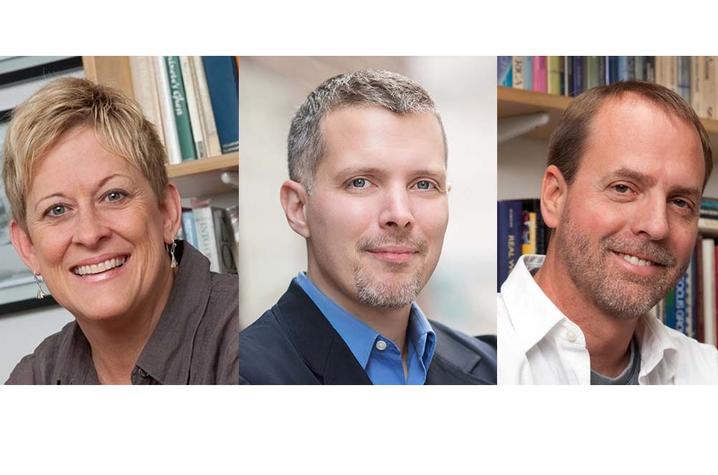By Rick Spencer Feb. 16, 2024

Kathryn Edin, Luke Schaefer and Timothy Nelson will lead a conversation about their book "The Injustice of Place." The event is free and open to the public. Photo provided by the Martin School of Public Policy and Administration
LEXINGTON, Ky. (Feb. 16, 2024) — A discussion with the authors of a compelling new study of poverty, "The Injustice of Place," will be free and open to the public 4 p.m. Thursday, Feb. 22, in the William T. Young Library Auditorium.
Kathryn J. Edin, Ph.D., H. Luke Shaefer, Ph.D., and Timothy J. Nelson, Ph.D., will discuss their research with the audience and a panel of students from the University of Kentucky Martin School of Public Policy and Administration and UK Appalachian Center.
This year’s discussion is the second annual event made possible by a generous donation from Judy Barager-Kemper, a Martin School alumna, and her family who named the Miriam Jane Van Dyke Barager Endowment for Diversity and Inclusion in honor of her mother. Programming is intended to encourage community engagement and broaden perspectives for students considering careers as public policy leaders.
“The Martin School is excited to co-host an important conversation for our University community. We think this will be a great opportunity for a thoughtful discussion for UK’s students, staff and faculty,” said Ron Zimmer, director of the Martin School.
"The Injustice of Place" presents personal stories of human resilience in Appalachia, Texas, and across seven states in the American South. Narratives of the lived experience enrich data driven insights from statistical analysis of the economic conditions and health outcomes to explain how one’s "place" informs the likelihood of a lifetime of bleak disadvantage.
“I was raised in rural America, and writing this book was like coming home. The richness of the stories we gleaned across the rural South, including Eastern Kentucky, is evident on every page, as we lift up the voices of its residents. What we learned in our exploration of this region was a revelation both to us and, we hope, to our readers,” said author Kathryn Edin.
Each year the Martin School of Public Policy and Administration invites their extensive community of alumni, scholars and students to participate in a multi-week book club focused on an issue of deep social and political significance to Kentuckians leading up to this event. The program’s design gives participants time to dive deep into the material and enriches the dialogue that happens at the event. In 2023, the student panel had questions for Karida L. Brown, Ph.D., that were directly connected to the reading and discussion they were having about her book in the weeks before.
“'The Injustice of Place' was an eye-opening account of what life is like in America’s internal colonies. I appreciated its in-depth look at how aspects such as social infrastructure, corruption, and exploitation have contributed to long-term disadvantages in communities. I would recommend this book to anyone who wants to learn more about inequity or simply expand their knowledge on America’s often overlooked places. I look forward to using what I learned in this book when analyzing policy in class and in my future career,” said Siena Pilati, a UK public policy student.
“The authors of 'Injustice of Place' ask the right questions of systematic exploitation as they dive into the 'internal colonies' and the deeply rooted monopoly that continues to impact disadvantaged communities today,” said Emily Simon, a UK public policy student.
The event is co-sponsored by the Appalachian Center and Appalachian Studies Program; the Martin-Gatton College of Agriculture, Food, and Environment Office of Diversity; the College of Arts and Sciences Department of Sociology; and the Graduate School Office of Diversity and Inclusion.
As the state’s flagship, land-grant institution, the University of Kentucky exists to advance the Commonwealth. We do that by preparing the next generation of leaders — placing students at the heart of everything we do — and transforming the lives of Kentuckians through education, research and creative work, service and health care. We pride ourselves on being a catalyst for breakthroughs and a force for healing, a place where ingenuity unfolds. It's all made possible by our people — visionaries, disruptors and pioneers — who make up 200 academic programs, a $476.5 million research and development enterprise and a world-class medical center, all on one campus.
In 2022, UK was ranked by Forbes as one of the “Best Employers for New Grads” and named a “Diversity Champion” by INSIGHT into Diversity, a testament to our commitment to advance Kentucky and create a community of belonging for everyone. While our mission looks different in many ways than it did in 1865, the vision of service to our Commonwealth and the world remains the same. We are the University for Kentucky.
